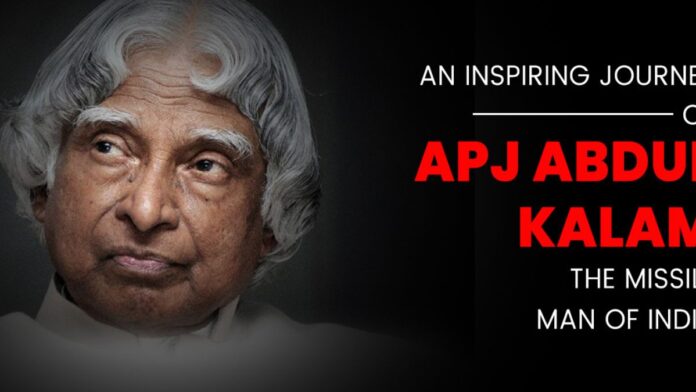Abdul Kalam : The Missile Man of India
Introduction :
Abdul Kalam, often referred to as the “Missile Man of India,” was an eminent scientist, educator, and statesman who served as the 11th President of India. Born on October 15, 1931, in Rameswaram, Tamil Nadu, Kalam rose from humble beginnings to become one of the most respected figures in India’s scientific community. Through his exceptional contributions to space and missile technology, he played a pivotal role in shaping India’s scientific progress and inspiring generations of young minds. In this blog, we will delve into the life and achievements of this remarkable individual who left an indelible mark on India and the world.
Early Life and Education :
Abdul Kalam was born in a humble Tamil Muslim family. His father, Jainulabdeen, was a boat owner, and his mother, Ashiamma, was a housewife. Kalam’s childhood was marked by financial struggles, but he was determined to overcome these challenges through education. He was an avid learner and possessed a natural curiosity about the world around him.
After completing his school education in Rameswaram, Kalam went on to study physics at St. Joseph’s College in Tiruchirappalli. His academic brilliance earned him a scholarship to pursue aerospace engineering at Madras Institute of Technology. It was during his time there that he developed a keen interest in aeronautical engineering and space technology.
Contributions to India’s Missile Program :
Kalam’s association with India’s missile program began in the 1960s when he joined the Defence Research and Development Organisation ( DRDO). He made significant contributions to the development of India’s first indigenous satellite launch vehicle, SLV-III, which successfully deployed the Rohini satellite in orbit. This achievement made India the sixth country in the world to have a satellite in space.
Kalam’s crowning glory came with the successful test-firing of the Agni and Prithvi missiles, which established India’s capabilities in missile technology. He played a crucial role in integrating nuclear capabilities with missile technology, contributing to India’s security and defense.
His vision and leadership led to the creation of the Integrated Guided Missile Development Program (IGMDP), which developed a range of strategic missiles for the Indian Armed Forces. Under his guidance, India achieved significant milestones, including the successful test-firing of the surface-to-surface missile, Agni-V, with a range of over 5,000 kilometers.
Presidency and Beyond :
In 2002, Abdul Kalam was elected as the President of India, a role he cherished as an opportunity to inspire and motivate the youth of the nation. During his presidency, he focused on several key areas, including education, sustainable development, and scientific research. He traveled extensively across the country, addressing students and encouraging them to pursue their dreams.
Even after his term as president ended, Kalam remained an influential figure, continuing to inspire and mentor young minds. He advocated for scientific research, education, and societal development, stressing the importance of innovation and creativity in building a prosperous nation.
Legacy and Honors :
Abdul Kalam‘s contributions to science and technology, along with his inspiring leadership, have left an enduring legacy. He received numerous prestigious awards and honors, including the Bharat Ratna, India’s highest civilian award. Kalam’s humble demeanor, strong work ethic, and unwavering commitment to serving the nation have made him a role model for millions.
Conclusion :
Abdul Kalam‘s life journey is a testament to the power of education, determination, and perseverance. From his humble beginnings to becoming a renowned scientist and the President of India, he exemplified the transformative potential that lies within each individual. Kalam’s vision for a technologically advanced and prosperous India, coupled with his unwavering dedication to youth empowerment, continues to inspire generations. The Missile Man of India will forever be remembered for his invaluable contributions to the nation’s scientific and technological advancements.
Read Also : https://sathyaapkesamane.com/rajasthans-first-chief-minister-hiralal-shastri/
Read Also : https://sathyaapkesamane.com/rajasthans-first-governor-shri-gurumukh-nihal-singh/
Read Also : https://sathyaapkesamane.com/biography-of-jagjit-singh/
Read Also : https://sathyaapkesamane.com/iron-man-of-india-vallabhbhai-patels-indomitable-legacy/
Read Also : https://sathyaapkesamane.com/indira-gandhi-a-dynamic-leader-who-shaped-indias-destiny/
Read Also : https://sathyaapkesamane.com/bhairon-singh-shekhawat-the-visionary-leader-of-rajasthan/
Read Also : https://sathyaapkesamane.com/sachin-pilot-a-promising-political-leader-and-catalyst-for-change/
Read Also : https://sathyaapkesamane.com/iron-man-of-india-vallabhbhai-patels-indomitable-legacy/
Read Also : https://sathyaapkesamane.com/minister-of-railways-ashwini-vaishnaw-biography/
Read Also : https://sathyaapkesamane.com/youtube-monetization-rules/
Read Also : https://sathyaapkesamane.com/jayson-tatum-says-he-was-shell-of-myself-after-ankle-injury/


















